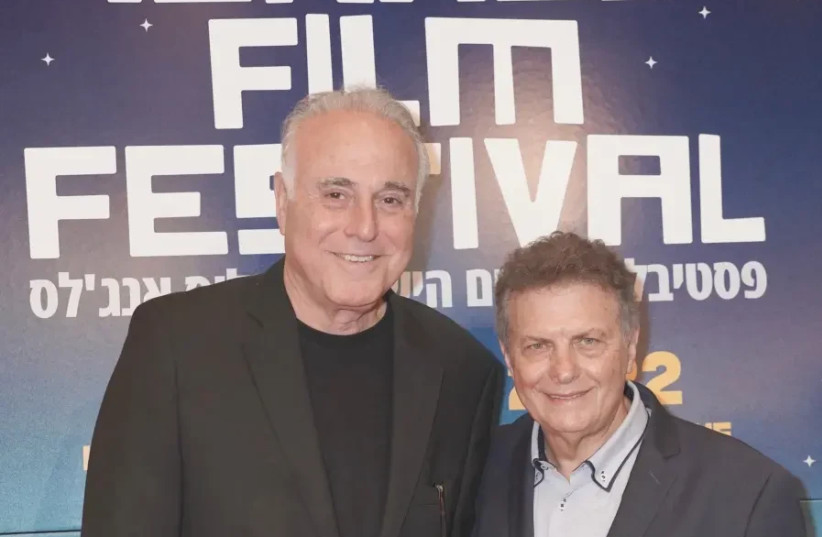Just before the 35th Israel Film Festival in Los Angeles opened on May 5, founder and director Meir Fenigstein found time for an interview in which he got emotional about how he went from being a musician who thought it might be nice to show a few Israeli movies in America to running a huge film festival audiences have been flocking to for decades to see the latest movies and television shows from Israel.
“It’s great that we are getting back to an in-person festival,” said Fenigstein, who was a member of the Israeli supergroup, Kaveret. He noted that Avi Nesher’s anti war epic set during the Independence War, Image of Victory, the festival’s opening-night film, is a movie “that needs to be seen on the big screen.”
“It’s the right film in the right place on the right day,” he said, referencing the fact that the movie would be shown on Independence Day at the huge Saban Theater in Beverly Hills and the movie’s producer, Ehud Bleiberg, who won the IFF Achievement Award this year, suggested that Nesher make a movie telling the story of the battle for this kibbutz, where his father had lived.
Showing Nesher’s most recent movie feels like an especially appropriate choice to Fenigstein. “The festival is coming full circle with Avi Nesher,” he said, because of Nesher’s first feature, Ha Lahaka (The Troupe). It tells the story of an IDF entertainment troupe, which starred Fenigstein along with a who’s who of Israeli actors and singers including Gali Atari, Doval’e Glickman and Tuvia Sapir. It came out in 1978 and was the opening night movie at the first Israel Film Festival.
“In those days, I thought it would be good if we had an Israeli film festival, Jewish audiences would be curious,” he said. But Israeli movies and television shows were not at the forefront of the entertainment industry back then. There were few quality Israeli films and even fewer television series. Fenigstein choked up as he reminisced about how little he knew and how he was taken under the wings of some prominent Israelis in the US, back when he was a young musician crashing in friends’ apartments in New York in the early 80s.

The first festival was held in Boston but while Fenigstein put ads in Jewish newspapers, he did not have the cash to take out an ad in the much higher circulation Boston Globe. An enthusiastic audience member paid for it and suddenly the screenings sold out, he recalled.
He turned to various well-connected Israelis in the US and befriended Gila Golan, a Holocaust survivor who was one of Israel’s early beauty queens, had a brief Hollywood career and married the Geritol tycoon, Matthew Bernard Rosenhaus. Charmed by her, he remembered how she gave him a leg up in the competitive fundraising world, about which he was completely naive. Thanks to her generosity, he was able to have such 80s luminaries as Brooke Shields and Howard Cosell at the next festival.
The festival has undergone many changes and one of the most dramatic in recent years is that it now showcases Israeli television, as well as movies, since the TV industry has become so important around the world.
In the festival centerpiece event, Israeli creator, producer and writer Hagai Levi (Scenes from a Marriage, In Treatment, The Affair, Our Boys) will be recognized with the 2022 Achievement in Television Award, on May 12. The event will also present the US premieres of the first episodes from the new season of the award-winning shows False Flag and Tehran.
“We are spotlighting TV for the festival centerpiece and the closing night this year,” he said. “In this last decade American television, viewers have discovered and embraced award-winning Israeli tv series that are being produced by today’s most innovative storytellers and talent from Israel. Creators like Hagai Levi have brought to the United States what Israeli audiences have long admired and enjoyed – original stories, fascinating characters and outstanding production values.”
Levi will appear and there will be a panel discussion that will include Dana Eden, co-creator of Apple TV and Kan’s series Tehran, and Daniel Syrkin, also a Tehran co-creator and its director.
Alon Shtruzman, CEO of Keshet International, which created False Flag, Marc Koman, a partner at WME in the Scripted Television department; Francesca Orsi, Senior Vice President of Drama Series at HBO, and Adam Berkowitz, founder of the Lenore Entertainment Group, who was instrumental in getting Fauda on Netflix, will moderate the panel.
On May 19, the closing night presentation will be an in-person screening of the American premiere of the Yes network’s The Beauty Queen of Jerusalem, just before it debuts on Netflix in the US. The screening will be followed by a Q&A with its lead actor Hila Saada.
The Israel Film Festival has held 70 festivals over the years in various cities, before settling into its Los Angeles home and the pace has been grueling at times, Fenigstein said.
“I think about stepping back but there is always something pushing me to the next one,” he said. “Next year it will be the 75th anniversary of the founding of Israel. And it will be the 36th anniversary of the festival – double chai [18 is the number that symbolizes life in Israeli tradition].” If he had to summarize his advice for success, he said, it would be: “You have to be blessed. And you have to continue.”

